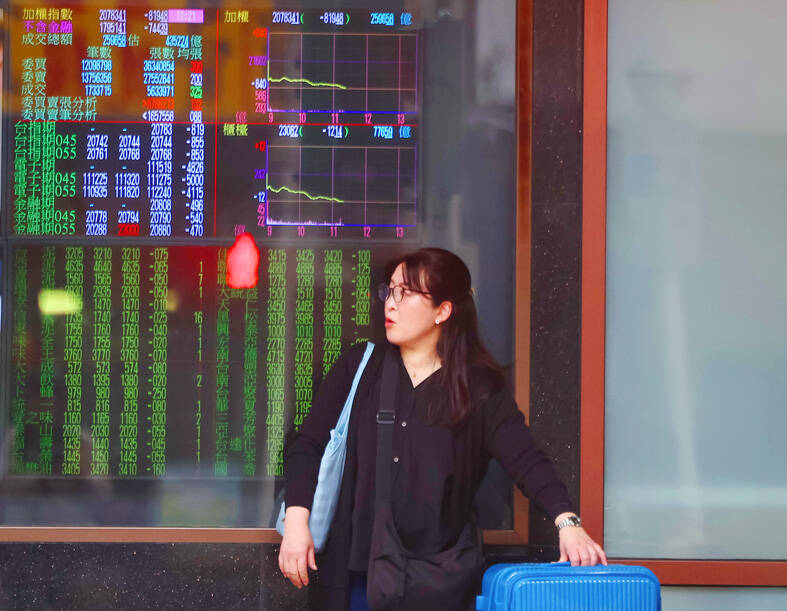The TAIEX yesterday plunged 4.2 percent, or 906.99 points, to an eight-month low of 20,695.9 — its fourth-steepest single-day drop — as investors offloaded risky assets ahead of US President Donald Trump’s expected announcement of reciprocal tariffs on Wednesday.
The benchmark index lost 10.2 percent, or 2,357 points, last month, wiping out a modest 0.08 percent gain from the first two months of the year, as capital flight intensified.
Financial Supervisory Commission Chairman Peng Jin-lung (彭金隆) and Deputy Minister of Finance Frank Juan (阮清華) attributed the rout to global jitters over the proposed tariffs, which Trump said are aimed at addressing the US’ long-standing trade deficit.

Photo: CNA
The tariffs are expected to raise production costs and weigh on global growth — a negative development for Taiwan’s export-driven economy, said Juan, who also serves as executive secretary of the National Stabilization Fund committee.
The government would activate the NT$500 billion (US$15.07 billion) fund if necessary to support the local bourse, Juan told lawmakers at a meeting of the legislature’s Finance Committee.
Peng said that corporate earnings matter more in driving the TAIEX’s performance, and the recent market correction has made local equities more attractive, compared with the price-earnings ratio of 20.46 times in late February.
Heavyweight tech stocks bore the brunt of the sell-off. Taiwan Semiconductor Manufacturing Co (TSMC, 台積電) dropped 4.41 percent, MediaTek Inc (聯發科) slid 5.12 percent and Hon Hai Precision Industry Co (鴻海精密), a major iPhone assembler, fell 5.19 percent.
Exchange-traded funds known for distributing quarterly cash dividends also sustained significant losses.
The capital flight exerted pressure on the New Taiwan dollar, which weakened NT$0.085 to close at NT$33.182 against the US dollar, central bank data showed.
Central bank Deputy Governor Chu Mei-lie (朱美麗) told lawmakers that the local currency remained relatively stable, depreciating just 1.09 percent against the US dollar last month, despite capital outflows exceeding NT$600 billion. By comparison, South Korea’s won fell 1.66 percent over the same period.
The Taiwan Stock Exchange yesterday urged investors to remain calm and assess external developments with caution and rationality, saying that strong global demand for chips used in the development of artificial intelligence has driven local semiconductor companies’ combined revenue to grow 25.42 percent year-on-year in the first two months of the year.

In Italy’s storied gold-making hubs, jewelers are reworking their designs to trim gold content as they race to blunt the effect of record prices and appeal to shoppers watching their budgets. Gold prices hit a record high on Thursday, surging near US$5,600 an ounce, more than double a year ago as geopolitical concerns and jitters over trade pushed investors toward the safe-haven asset. The rally is putting undue pressure on small artisans as they face mounting demands from customers, including international brands, to produce cheaper items, from signature pieces to wedding rings, according to interviews with four independent jewelers in Italy’s main

Japanese Prime Minister Sanae Takaichi has talked up the benefits of a weaker yen in a campaign speech, adopting a tone at odds with her finance ministry, which has refused to rule out any options to counter excessive foreign exchange volatility. Takaichi later softened her stance, saying she did not have a preference for the yen’s direction. “People say the weak yen is bad right now, but for export industries, it’s a major opportunity,” Takaichi said on Saturday at a rally for Liberal Democratic Party candidate Daishiro Yamagiwa in Kanagawa Prefecture ahead of a snap election on Sunday. “Whether it’s selling food or

CONCERNS: Tech companies investing in AI businesses that purchase their products have raised questions among investors that they are artificially propping up demand Nvidia Corp chief executive officer Jensen Huang (黃仁勳) on Saturday said that the company would be participating in OpenAI’s latest funding round, describing it as potentially “the largest investment we’ve ever made.” “We will invest a great deal of money,” Huang told reporters while visiting Taipei. “I believe in OpenAI. The work that they do is incredible. They’re one of the most consequential companies of our time.” Huang did not say exactly how much Nvidia might contribute, but described the investment as “huge.” “Let Sam announce how much he’s going to raise — it’s for him to decide,” Huang said, referring to OpenAI

The global server market is expected to grow 12.8 percent annually this year, with artificial intelligence (AI) servers projected to account for 16.5 percent, driven by continued investment in AI infrastructure by major cloud service providers (CSPs), market researcher TrendForce Corp (集邦科技) said yesterday. Global AI server shipments this year are expected to increase 28 percent year-on-year to more than 2.7 million units, driven by sustained demand from CSPs and government sovereign cloud projects, TrendForce analyst Frank Kung (龔明德) told the Taipei Times. Demand for GPU-based AI servers, including Nvidia Corp’s GB and Vera Rubin rack systems, is expected to remain high,